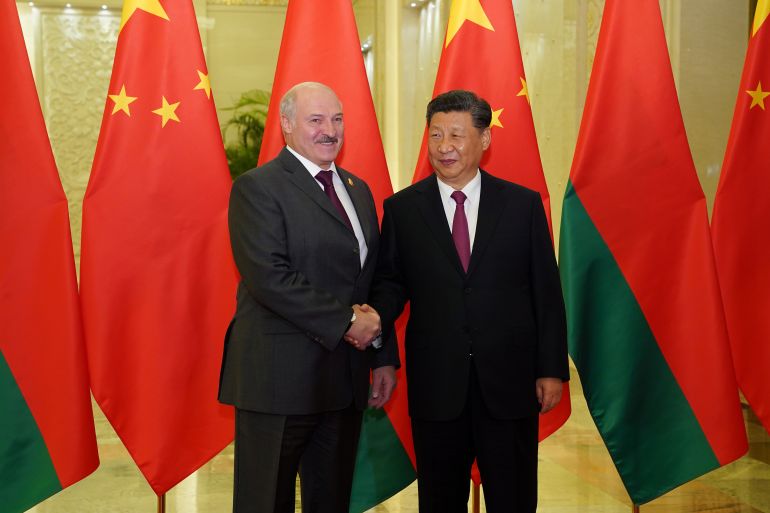China, Belarus presidents call for establishing peace in Ukraine
Xi Jinping and Alexander Lukashenko call for the ‘soonest possible’ peace deal for Ukraine.

China President Xi Jinping and his Belarusian counterpart Alexander Lukashenko have called for a ceasefire and negotiations to bring about a political settlement to the Ukraine conflict at talks in Beijing.
The two leaders issued a joint statement on Wednesday in which they expressed “deep concern about the development of the armed conflict in the European region and extreme interest in the soonest possible establishment of peace in Ukraine”, according to the Belarusian state news agency Belta.
Keep reading
list of 3 itemsA year into Ukraine war, food prices rise and aid drops in Niger
Putin warns of espionage as Russia presses Ukraine’s Bakhmut
“Belarus and China are interested in averting an escalation of the crisis and ready to make efforts to restore regional peace and order,” it added.
Their summit brought together two of the foreign leaders on whom Russian President Vladimir Putin is most reliant for support as his army struggles to achieve the goals of its year-old invasion.
Beijing has become increasingly vocal in calling for peace as the Ukraine conflict drags on, and denied it would provide arms to Moscow after US officials said China was considering doing so.
Last week, it issued a 12-point paper calling for a comprehensive ceasefire in Ukraine that largely summarised China’s previous stance and met scepticism in the West.
In televised comments, Xi said China was eager to strengthen trust and cooperation with Belarus “given the instability and turbulence of the international situation”.
In a clear reference to the US and its allies, Xi added, “relevant countries should stop politicising and using the world economy as their tool, and take measures that truly advance a cease-fire and stop to war and resolve the crisis peacefully.”
‘Descent into a global confrontation’
Lukashenko said the meeting was taking place “in a very complicated time” and was necessary to prevent “an uncontrolled descent into a global confrontation which has no winners”.
He said Xi, in his peace plan, had “clearly, definitively, pointedly declared this to the international community.
“This is why Belarus has been actively putting forward its peace proposals, and comprehensively supports your incentive on international security,” he added.
China has long had a close relationship with Lukashenko, and following their talks, the two leaders oversaw the signing of a raft of cooperation agreements in areas ranging from agriculture to customs enforcement and sports.
However, the Belarusian leader’s trip also illustrated the depth of Beijing’s ties to Russian leader Putin and his allies.
China has said it is a neutral party in the conflict and has maintained contacts with the government of Ukrainian President Volodymyr Zelenskyy, who has cautiously welcomed Beijing’s involvement, but said success would depend on actions, not words.
Despite that, China has said it has a “no-limits friendship” with Russia and has refused to criticise Moscow’s invasion, or even to refer to it as such.
It has accused the US and NATO of provoking the conflict and of “fanning the flames” by providing Ukraine with defensive arms, while also condemning sanctions levelled against Russia and entities seen as aiding its military effort – including Chinese companies.
Belarus shares a border with both Ukraine and Russia, but is financially and politically dependent on the Putin administration. Lukashenko’s government has strongly backed Moscow and allowed Belarus’ territory to be used as a staging ground for the initial invasion of Ukraine a year ago.
Russia has maintained a contingent of troops and weapons in Belarus and the two neighbours and allies conducted joint military drills.
This stance left Lukashenko even more isolated in Europe, where his country faces sanctions from the European Union for both its role in the war and Lukashenko’s repression of domestic opposition.
China also has long ties with Lukashenko, who has been Belarus’ only president since the position was created in 1994. He brutally suppressed 2020 protests against his disputed reelection in a vote that the opposition and Western countries regarded as fraudulent.